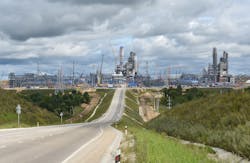Gazprom’s Amur gas processing plant 72% complete
PJSC Gazprom has completed 72% of construction activities on subsidiary OOO Gazprom Pererabotka Blagoveshchensk’s 42 billion-cu m/year grassroots Amur natural gas processing plant (GPP) near Svobodny in Russia’s far-east Amur region (OGJ Online, Oct. 29, 2020; Apr. 27, 2020; Apr. 12, 2018).
On Feb. 17, Gazprom said the Amur GPP’s first two production trains remain on schedule for startup in 2021.
Part of Gazprom’s implementation of its Eastern Gas Program (EGP) to integrate field developments, pipeline, and natural gas production centers in East Siberia and Russia’s Far East, the Amur GPP will process multicomponent gas it receives from EGP’s Irkutsk and Yakutia gas production centers via the Power of Siberia gas pipeline to support Gazprom’s commitment to supply 38 billion cu m/year of Russian natural gas into China over 30 years (OGJ Online, May 29, 2020; May 21, 2014).
Alongside producing about 2.5 million tpy of ethane, 1 million tpy of propane, 500,000 tpy of butane, and 200,000 tpy of pentane-hexane fraction, the six-train Amur gas processing complex also will produce as much as 60 million-cu m/year of helium based on feedstock from Chayandinskoye field, which together with the company’s other reserves in East Siberia, forms one of the largest helium reservoirs in the world (OGJ Online, Dec. 19, 2012).
Other gas processing projects
Gazprom additionally confirmed preparatory site works remain under way for the planned natural gas processing, liquefaction, and chemical complex to be operated by RusKhimAlyans—a 50-50 special-purpose venture of Gazprom and RusGazDobycha—on the Gulf of Finland near the seaport of Ust-Luga, Leningrad Oblast, Russia (OGJ Online, June 10, 2020; May 21, 2020; Apr. 2, 2019).
Gazprom will supply 45 billion cu m/year (bcmy) of wet natural gas from its Achimov and Valanginian deposits in the Nadym-Pur-Taz region of the Yamal Peninsula to the RusKhimAlyans complex, which will have 13 million-tpy liquefaction capacity. Gas remaining after processing (including ethane extraction) and LNG production, about 18 bcmy, will go into Russia’s gas transmission system. The complex will produce as much as 4 million tpy of ethane, and more than 2.2 million tpy of LPG.
LNG and LPG produced at the Ust-Luga complex will be exported, while ethane from the site will feed nearby RusGazDobycha subsidiary Baltic Chemical Complex LLC’s (BCC) proposed $13-billion ethane cracking project, which—once in operation—will produce more than 3 million tpy of polymers (OGJ Online, Nov. 9, 2020).
As of mid-February 2021, design documentation for the RusKhimAlyans gas processing, liquefaction, and off-site installations remained under state-expert view, according to Gazprom.
Gazprom also said construction work continues on subsidiary OOO Novourengoysky GCC’s Novy Urengoy gas chemical complex in the Yamal-Nenets Autonomous Area as part of a 2019 coordination agreement between Gazprom and PJSC Sibur Holding to join forces in implementing major investment projects in gas processing and gas chemical production (OGJ Online, Oct. 4, 2019).
Intended to enable processing of dethanized condensate from the Nadym-Pur-Taz region, the project will enable processing of 1.456 million tpy of ethane-containing gas to produce 400,000 tpy of low-density polyethylene, according to Gazprom.
In 2020, Gazprom completed engineering surveys, diagnostics of previously procured and installed equipment, pipelines and technical devices, inspection of buildings and structures, and drafting of design documentation to further construction of the Novy Urengoy gas chemical complex, the operator said.
About the Author
Robert Brelsford
Downstream Editor
Robert Brelsford joined Oil & Gas Journal in October 2013 as downstream technology editor after 8 years as a crude oil price and news reporter on spot crude transactions at the US Gulf Coast, West Coast, Canadian, and Latin American markets. He holds a BA (2000) in English from Rice University and an MS (2003) in education and social policy from Northwestern University.

